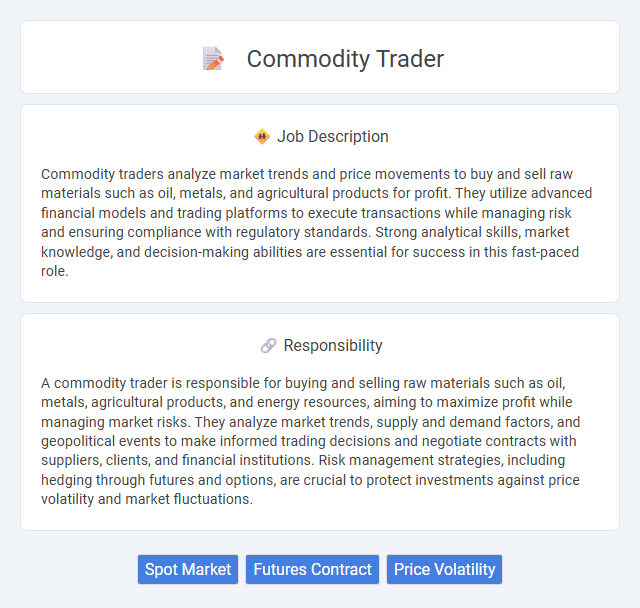
Commodity traders analyze market trends and price movements to buy and sell raw materials such as oil, metals, and agricultural products for profit. They utilize advanced financial models and trading platforms to execute transactions while managing risk and ensuring compliance with regulatory standards. Strong analytical skills, market knowledge, and decision-making abilities are essential for success in this fast-paced role.
Commodity trading may suit individuals who thrive in fast-paced, high-pressure environments and possess strong analytical skills to interpret market trends and risks. Those comfortable with uncertainty and capable of making quick decisions under volatility are likely to find this career rewarding. People who prefer routine or avoid stress might struggle to adapt to the dynamic nature of this profession.
Qualification
A commodity trader typically requires a strong background in finance, economics, or business, often demonstrated by a bachelor's degree in these fields or related disciplines. Proficiency in market analysis, risk management, and understanding of global supply chains enhances trading effectiveness. Advanced certifications like the Chartered Financial Analyst (CFA) or Financial Risk Manager (FRM) can further validate expertise and improve career prospects in commodity trading.
Responsibility
A commodity trader is responsible for buying and selling raw materials such as oil, metals, agricultural products, and energy resources, aiming to maximize profit while managing market risks. They analyze market trends, supply and demand factors, and geopolitical events to make informed trading decisions and negotiate contracts with suppliers, clients, and financial institutions. Risk management strategies, including hedging through futures and options, are crucial to protect investments against price volatility and market fluctuations.
Benefit
A commodity trader job likely offers significant financial rewards through profit gained from buying and selling raw materials. The role may provide valuable market insight and experience in global trade dynamics, enhancing career growth opportunities. Access to diverse markets and the potential for high commissions probably makes this position attractive to ambitious professionals.
Challenge
Commodity trading likely involves navigating high volatility in global markets, which can create significant risk and uncertainty. Traders probably face the challenge of quickly analyzing diverse data sources to make informed decisions under pressure. The role may demand strong strategic thinking and adaptability to manage rapidly changing economic and geopolitical factors.
Career Advancement
Commodity trader career advancement often involves mastering market analysis, risk management, and negotiation skills to handle increasingly complex transactions and larger portfolios. Progression typically includes shifting from junior roles to senior trader positions, portfolio manager, or trading desk lead, demanding expertise in global commodity markets like oil, metals, and agricultural products. Continuous professional development through certifications such as the Chartered Financial Analyst (CFA) or Certified Commodity Trader (CCT) enhances prospects for leadership roles and higher compensation.
Key Terms
Spot Market
Commodity traders operating in the spot market engage in the immediate purchase and sale of physical goods such as oil, metals, and agricultural products, capitalizing on real-time price fluctuations. They analyze market trends, supply-demand dynamics, and geopolitical factors to execute timely transactions that maximize profit margins. Risk management strategies and strong negotiation skills are essential for navigating volatility and securing favorable contracts in the fast-paced spot market environment.
Futures Contract
Commodity traders specialize in buying and selling futures contracts to hedge risks or speculate on price movements of physical goods like oil, metals, and agricultural products. Mastery of market analysis, contract specifications, margin requirements, and settlement procedures is essential to optimize profit margins while managing financial exposure. Successful traders leverage real-time data, geopolitical insights, and supply-demand trends to execute timely futures trades in global commodity markets.
Price Volatility
Commodity traders navigate significant price volatility by analyzing market trends, supply-demand imbalances, and geopolitical factors to optimize trade decisions. Effective risk management strategies, including hedging with futures and options, are essential to mitigate financial exposure caused by fluctuating prices. Continuous monitoring of real-time market data and economic indicators enables commodity traders to capitalize on price movements and maximize profitability.
 kuljobs.com
kuljobs.com